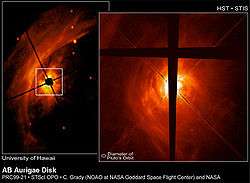AB Aurigae
 AB Aurigae and its dust disk. | |
| Observation data Epoch J2000 Equinox J2000 | |
|---|---|
| Constellation | Auriga |
| Right ascension | 04h 55m 45.8445s |
| Declination | +30° 33′ 04.292″ |
| Apparent magnitude (V) | 7.06 |
| Characteristics | |
| Spectral type | A0Vpe |
| U−B color index | 0.04 |
| B−V color index | 0.11 |
| Variable type | Orion variable |
| Astrometry | |
| Radial velocity (Rv) | 8 km/s |
| Proper motion (μ) | RA: 1.71 mas/yr Dec.: -24.24 mas/yr |
| Parallax (π) | 6.93 ± 0.95 mas |
| Distance | approx. 470 ly (approx. 140 pc) |
| Absolute magnitude (MV) | 7.18 |
| Details | |
| Mass | 3.1 M☉ |
| Radius | 2.1 R☉ |
| Luminosity | 40 L☉ |
| Temperature | 7,500–10,000 K |
| Age | 3 ± 4 million years |
| Other designations | |
| Database references | |
| SIMBAD | data |
| Data sources: | |
| Hipparcos Catalogue, CCDM (2002), Bright Star Catalogue (5th rev. ed.) | |
AB Aurigae is a star in the Auriga constellation. It is better known for hosting a dust disk that may harbour a condensing planet or brown dwarf. The star could host a possible substellar companion in wide orbit.
Planetary System
Oppenheimer et al. (2008)[1] observed an annulus feature in AB Aurigae's dust disk between 43 and 302 AU from the star, a region never seen before. An azimuthal gap in an annulus of dust at a radius of 102 AU would suggest the formation of at least one small body at an orbital distance of nearly 100 AU. Such object could turn out either a massive planetary companion or more likely a brown dwarf companion, in both cases located at nearly 100 AU from the bright star. So far the object is unconfirmed.
| Companion (in order from star) |
Mass | Semimajor axis (AU) |
Orbital period (years) |
Eccentricity | Inclination | Radius |
|---|---|---|---|---|---|---|
| b (unconfirmed) | ≥5–37 MJ | 102 | ≥800 | ? | — | — |
See also
- Herbig–Bell catalog
References
- 1 2 Oppenheimer, Ben R.; et al. (2008). "The Solar-System-Scale Disk around AB Aurigae". The Astrophysical Journal. 679 (2): 1574–1581. arXiv:0803.3629
 . Bibcode:2008ApJ...679.1574O. doi:10.1086/587778.
. Bibcode:2008ApJ...679.1574O. doi:10.1086/587778.
Further reading
- Telleschi, A.; Güdel, M.; Briggs, K. R.; Skinner, S. L.; Audard, M.; Franciosini, E. (2007). "The first high-resolution X-ray spectrum of a Herbig star: AB Aurigae". The Astrophysical Journal. 468 (2): 541–556. arXiv:astro-ph/0610456
 . Bibcode:2007A&A...468..541T. doi:10.1051/0004-6361:20065422.
. Bibcode:2007A&A...468..541T. doi:10.1051/0004-6361:20065422. - Oppenheimer, Ben R.; Brenner, Douglas; Hinkley, Sasha; Zimmerman, Neil; Sivaramakrishnan, Anand; Soummer, Remi; et al. (2008). "The Solar-System-Scale Disk around AB Aurigae". The Astrophysical Journal. 679 (2): 1574–1581. arXiv:0803.3629
 . Bibcode:2008ApJ...679.1574O. doi:10.1086/587778.
. Bibcode:2008ApJ...679.1574O. doi:10.1086/587778. - Bitner, Martin A.; Richter, Matthew J.; Lacy, John H.; Greathouse, Thomas K.; Jaffe, Daniel T.; Blake, Geoffrey A. (2007). "TEXES Observations of Pure Rotational H2 Emission from AB Aurigae". The Astrophysical Journal. 661 (1): L69–L72. arXiv:0704.1481
 . Bibcode:2007ApJ...661L..69B. doi:10.1086/518717.
. Bibcode:2007ApJ...661L..69B. doi:10.1086/518717. - Fukagawa, Misato; Hayashi, Masahiko; Tamura, Motohide; Itoh, Yoichi; Hayashi, Saeko S.; Oasa, Yumiko; et al. (2004). "Spiral Structure in the Circumstellar Disk around AB Aurigae". The Astrophysical Journal. 605 (1): L53–L56. Bibcode:2004ApJ...605L..53F. doi:10.1086/420699.
- L. P. Keller; S. Hony; J. P. Bradley; F. J. Molster; L. B. F. M. Waters; J. Bouwman; et al. (2002). "Identification of iron sulphide grains in protoplanetary disks". Nature. 417 (6885): 148–150. Bibcode:2002Natur.417..148K. doi:10.1038/417148a. PMID 12000914.
- Overbye, Dennis (2008-03-26). "Star's Dust May Hold Clue to New Planet". www.nytimes.com. Archived from the original on December 10, 2008. Retrieved 2008-08-20.
- "Image AB Aurigae". SIMBAD. Retrieved 2008-08-20.
- "AB Aurigae: How To Make Planets". NASA. Archived from the original on 29 September 2008. Retrieved 2008-08-20.
- "AB Aurigae". jumk.de. Retrieved 2008-10-15.
- "Planet in Progress? Evidence Of A Huge Planet Forming In Star System". Science News. Archived from the original on 10 October 2008. Retrieved 2008-10-15.
- "Spiral Dance in a Planetary Nursery". Subaru Telescope. Retrieved 2008-10-15.
- "The Source of Stelar Magnetism". news.softpedia.com. Retrieved 2008-10-16.
- "XMM-Newton unlocks magnetic mystery". iTWire. Retrieved 2008-10-16.
- "Silicate Stardust in Meteorites". Planetary science research. Retrieved 2008-10-16.
- "Image Multimidea Gallary ESA". ESA. Retrieved 2008-10-16.
External links
This article is issued from Wikipedia - version of the 9/13/2016. The text is available under the Creative Commons Attribution/Share Alike but additional terms may apply for the media files.